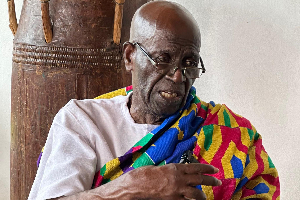Apam (C/R), Sept. 10, GNA- Ghana would be unable to achieve the Roll Back Malaria (RBM) target of reducing the disease morbidity and mortality by 50 per cent in 2010. Mr Emmanuel Fiagbey, Country Director of the Voices for Malaria Free Future, Ghana, a non-governmental organisation (NGO) made this known at Apam, in the Gomoa West District of the Central Region on Thursday.
He said although the country had made some progress to reach the target, malaria still accounted for 19 per cent of deaths of all ages with 22 per cent of the mortality rate among children under five. Ghana adopted the World Health Organisation's RBM strategy in 2000, and was expected to have reduced malaria deaths to at least 7.5 per cent in all ages and 11 per cent in children under five. Mr Fiagbey said this at a forum organised by the NGO for stakeholders in the fight against malaria.
According to the RBM Country Needs Assessment report in 2008, Ghana's malaria morbidity ratio stood at 120 per 1,000 cases for all ages instead of meeting the target of 86 per 1,000. Malaria was also responsible for 35 per cent of morbidity in children under five, which fell short of the RBM target of 23 per cent. Mr Fiagbey noted that the country had however made some significant progress in the management of severe malaria, preventive treatment of expectant mothers and the use of insecticide treated nets by pregnant women and children under five.
He therefore called for more government and public commitment for the adoption of interventions that would help to scale up the country's progress in meeting the RBM goals. He indicated that the heavy rains experienced in the Sub-Saharan Region this year, would likely increase malaria cases, adding that, this calls on all African government to commit more resources to fight the pandemic instead of solely relying on the Global Fund. Mr Fiagbey appealed to government to consider allocating a percentage of the country's oil revenue to interventions that would help reduce malaria cases.
He also urged the district assemblies to ensure that they commit the mandatory 0.5 per cent of their share of the District Assemblies' Common Fund to fight the disease. Mr Theophilus Aidoo-Mensah, District Chief Executive, expressed worry about malaria deaths and its impact on the national economy and entreated all stakeholders to do more to eliminate the disease. He noted that malaria accounted for more than 40 per cent of all Out Patient Department cases in the district hospital and appealed to opinion leaders at Apam to facilitate the fight against the pandemic. 10 Sept. 09
General News of Thursday, 10 September 2009
Source: GNA












